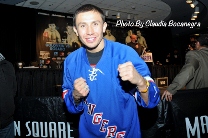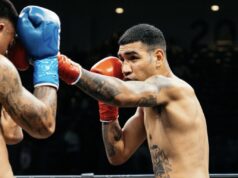
Saturday on the small stage at Madison Square Garden, before a crowd of 5,000 – in a city of 8.3 million – a throng one euphoric commentator described as both “electric” and “jumping,” Kazakhstani middleweight titlist Gennady “GGG” Golovkin scored a corner stoppage over Brooklyn’s Curtis “Showtime” Stevens at the end of round 8, after dropping Stevens in round 2, and battering him for what 18 minutes followed. It was another fearsome beating administered another barely ranked opponent, by Golovkin, a beating to inspire still more fearless commentary.
One must wonder if Gennady Golovkin’s interpreter tells him what expectations now rest their weight on the boyish Kazakhstani’s juicy deltoids, the hope a television network now kindles that he will be an all-time great, whatever defensive limitations he might have, however late their campaign for his greatness started. If Golovkin is going only on his perception of what is said to him by HBO talent in fighter meetings, in English, a language he does not yet speak coherently – “OK, man, I respect box, I respect everybody,” he said after Saturday’s fight, “I respect everybody athletes, I respect everybody sports, you know, this is a sport for me, first, hey man, going to home just tell your parents just, ‘Hi, I come back, thank you’” – he may not grasp yet the gravity of others’ expectations, of the investment, financial and reputational, boxing’s most powerful network now makes in him. Golovkin likely does not, or he would fight with greater urgency than he showed Saturday against Curtis Stevens, a chinny man he struck nearly 300 times en route to a corner stoppage quite similar to the one he scored on Gabriel Rosado in January.
Golovkin (28-0, 25 KOs) just required 96 seconds longer to bring Stevens to justice than did Marcos Primera (20-28, 13 KOs), a man who has not won a single contest since stopping Stevens more than seven years ago, evidence of nifty matchmaking at least. That Golovkin’s official promoter, K2, has as its figurehead Wladimir Klitschko implies a cautious approach to matching a man whose unofficial promotional company, HBO, finds an extraordinary number of openings every telecast and ring announcement to mention Golovkin’s record-breaking knockout percentage as champion, which would be more meaningful, if not quite meaningful, if Golovkin actually were the middleweight champion, or at least if there were not already a lineal middleweight champion who was not Golovkin and whose reign as champion did not precede Golovkin’s by four months. Or does it violate decorum to mention such a thing in the throes of this, our fourth orGGGy of 2013?
Asked to call-out a postfight opponent, Golovkin wisely chose a limited fellow titlist already promised to another network and a champion already promised to Miguel Cotto. Good boy: when spring of 2014 finds Marco Rubio or Max Bursak on the bill, it will demonstrate only that Golovkin is so feared neither Peter Quillin nor Sergio Martinez had the courage to ply limited wares before Golovkin’s marketplace of pain – an absurdity in the case of Martinez, a man who fought but once at 160 pounds before decisioning the lineal middleweight champion of the world, before spearchiselling a guy, Paul Williams, who held boxing’s Most Avoided title after decisioning that moment’s Most Feared titlist, Antonio Margarito. Much as it may warm this instant to project fear on Martinez’s inactive fighting spirit, it’s not likely a guy who needed 500 punches to stop Rosado and Stevens on their feet makes “Maravilla” sleep fitfully on his leopard-skin satins.
So here’s a callout worth making: Andre Ward. Before we say once more about a guy who this year laid waste to two career 154 pounders, at middleweight, before April Fools’ Day, he will “fight anyone from 154 pounds to 168,” we might at least give him a tryout with Julio Cesar Chavez Jr., whom, it says here, Saturday night’s Golovkin would need 1,200 punches to stop, or else put him directly in the ring with Ward, a prizefighter who, we might remember for the sake of comparison, is 22 months younger than Golovkin.
The year Golovkin captured a silver medal in the Olympics, Ward won gold. And in the 25 months Ward beat Mikkel Kessler, Allan Green, Sakio Bika, Arthur Abraham and Carl Froch, winning the Super Six tournament, Golovkin beat Mikhail Makarov (10-0), Milton Nunez (21-1-1), Nilson Julio Tapia (14-2-1), Kassim Ouma (27-7-1) and Lajuan Simon (23-3-2). For all Golovkin’s prowess in sparring sessions, it is instructive to recall in the moment Golovkin was racing through Simon, Ward was preparing to beat Froch – as proper a juxtaposition of the words “untested” and “tested” as exists in prizefighting from 154 pounds to 168.
Golovkin is entirely effective at beating up men who retreat and nearly as effective at causing their flight. But even Curtis Stevens, whose eyes rolled grotesquely sideways when a Golovkin left hook bounced his head off the blue mat in round 2, was able to neutralize at least temporarily Golovkin’s attack, and place a few decent shots of his own, by muscling forward to a range at which Golovkin does not seem nearly comfortable as he is at middle distance.
Andre Ward is the current best in our sport at getting to an opponent’s chest, discomfiting him, and removing all traces of menace; in a match with Golovkin, Ward would clinch, headbutt, shoulder and infight, and he would snatch the spirit from Golovkin the very way Bernard Hopkins did to Felix Trinidad, at the very moment Trinidad was both more dominating and more tested than Golovkin is now. Or perhaps he would not; perhaps Ward, too, would succumb to Golovkin’s relentless fiststorm, justifying fully half the credit Golovkin enjoys for what fantastical beasts his partisans currently see him hypothetically slaying.
Bart Barry can be reached at bart.barrys.email (at) gmail.com










